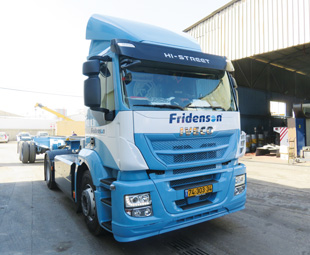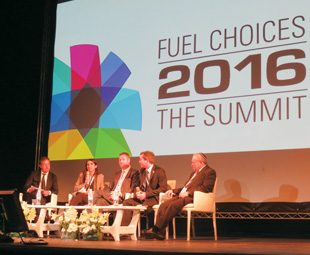Israel leads the way

JARLATH SWEENEY, from the Irish magazine Fleet Transport, attends the Fuel Choices Initiative Summit and reports that Israel’s future looks to be green
“We are changing the world; the monopoly of crude oil will end. We are creating a cleaner, greener world. Our vision is becoming a reality and we will continue to innovate and create cutting-edge technology, which is the secret to our success,” stated Israel’s prime minister on a video link to the fourth annual Fuel Choices Summit in Tel-Aviv.
Established in 2011, the Fuel Choices Initiative is Israel’s programme for alternative fuels and smart mobility. Ten government agencies are involved: Energy, Transport, Economy, Finance, Environmental Protection, Science, Defence, Agriculture, Foreign Affairs and the prime minister’s office, which heads up the project.
In the five years marking the halfway point of the programme, significant progress has been achieved with the fostering and integration of the local ecosystem increasing enormously, according to Eyal Rosner, chairman and administration director of the Fuel Choices Initiative at the prime minister’s office.
“In 2011, there were 45 research groups and 60 companies involved, and ₪₪1 000 million (Israeli shekel) was allocated towards capital investment. So far this year, these figures have increased to 220 research groups and 500 companies with the cumulative investment reaching ₪8 000 million.
“Oil usage across the board is massive and growing. As an energy source for transportation, it has almost a monopoly,” said Rosner. “We aspire to live in a world free from dependence on crude oil, with a wide variety of accessible, clean means of transportation.”
As the aim is to reduce dependency on oil, there is a focus on further researching the development of viable alternatives such as electricity and synthetic and bio-fuels.
Another objective of the initiative is to progress technologies forward assisted by the original equipment manufacturers (OEMs) involved in autonomous and connected vehicles. The seamless journey of users is the main focus. All these elements were explored and discussed at the Fuel Choices Summit 2016 held at the Habima Theater, Tel-Aviv.
Israel is becoming the centre of knowledge and industry in the field of alternative fuels and smart transportation. However, its ultimate goal is to reduce the country’s oil usage in transport by 60 percent by 2025, while supporting green initiatives and raising global awareness.
Different segments need different solutions and the government is aware of the need to build infrastructure that supports the reduction of oil consumption, and to put the proper structures and incentives in place.
There is a special focus on sectors that depend the most on oil − such as trucks, buses and taxis − which collectively contribute to over 40 percent of oil usage.
 Natural gas seems to be the most viable solution for trucks and buses, with methanol being an option for cars, following a significant breakthrough from a collaborative project involving Fiat Chrysler Automobiles (FCA), DOR Chemicals and the Fuel Choices Initiative.
Natural gas seems to be the most viable solution for trucks and buses, with methanol being an option for cars, following a significant breakthrough from a collaborative project involving Fiat Chrysler Automobiles (FCA), DOR Chemicals and the Fuel Choices Initiative.
FCA’s sister company, CNH Industrial, is assisting with the implementation of infrastructure to service its range of trucks and buses powered by compressed natural gas (CNG).
The Standard Institute of Israel has set a new regulation for use of methanol, which prescribes a mixture of 85 percent petrol and 15 percent methanol. A Fiat 500, which has been adapted to run on this fuel mix, was revealed to the public at the Summit.
CNH Industrial’s commitment to vehicles that are run on natural gas is well known through its brands Iveco, Iveco Bus and Heuliez Bus. It is the recognised leader in the development, manufacture and distribution of vehicles powered by CNG, liquefied natural gas (LNG) and biomethane.
CNG combustion emissions create less pollution than petrol and diesel, and the engines are less noisy, too. Over the past 25 years, CNH Industrial companies sold more than 32 000 CNG-powered engines for both on- and off-road markets.
Last year alone, more than 900 natural gas Iveco trucks and Iveco Buses were delivered to customers around Europe. Twenty-five percent of these units were installed on low-floor city buses.
The new partnership with the Israel Fuel Choices campaign has begun with the first ever natural-gas-powered truck being put into operation. The truck was an Iveco Stralis 4×2 tractor unit deployed by the Fridenson Group, one of the country’s largest transport companies.
A trip to the headquarters in Haifa was organised in order for us to see the new truck and speak to its driver, who said that he loves driving the truck and that he can get about 400 km on one full tank.
The CNG-powered truck has generated great interest among the transport industry. It is envisaged that Fridenson will invest in the latest Stralis NP, which provides additional power and distance. In addition, Super Gas, a major supplier of natural gas to the industry in Israel, uses a CNG-powered Iveco Daily to transport its gas bottles to customers.
According to Clement Chandon, who heads up heavy line gas business development at Iveco, natural gas represents a bridge from renewable sources such as biomethane to gas. “In this context, CNH Industrial’s agricultural machinery brand, New Holland Agriculture, is currently testing its T6.140 Methane Power tractor.
“This second-generation prototype represents a key step towards the Energy Independent Farm concept, which focuses on the ability of farms to produce energy from natural sources − in this case biomass − which, in turn, will power the machines and the farm itself. This is another future concept that could successfully be applied in many agricultural scenarios around the world, including the Israeli farming sector.”
Chandon explained that his current work is expanding the specification and configuration types of the Stralis NP, which runs on compressed and liquefied natural gas (LNG).
The 4×2 tractor will soon be joined by a 4×2 low-cab rigid for car and truck transportation (with
De Rooy, NL). Featuring the latest FPT Industrial Cursor 9 natural-power Euro-6 engine, the LNG-only version has recorded a range distance of 1 500 km, which makes it suitable for long-haul operations.
The Stralis NP was honoured at the Fleet Transport Awards with the title: “Irish Green Commercial of the Year 2017”.
A major French supermarket wishes to invest in an urban delivery truck, which is the next exciting development to hit the market. It will be based on a rigid version of the Stralis and will run on biomethane.
Chandon is targeting the main markets in Europe that already have a refuelling infrastructure in place such as Germany, France, the United Kingdom, Poland and Italy, which is the biggest market in Europe. By the end of 2017, Iveco plans to sell 2 000 units − double that of its 2016 figure.
As regular readers of FOCUS know, this magazine has been appointed an associate member of the International Truck of the Year (IToY)! FOCUS is the sole South African magazine to have joined this prestigious body. One of the advantages of this association is access to exclusive articles, specially written for FOCUS by ITOY jury members. This is one such article.
Published by
Focus on Transport
focusmagsa



